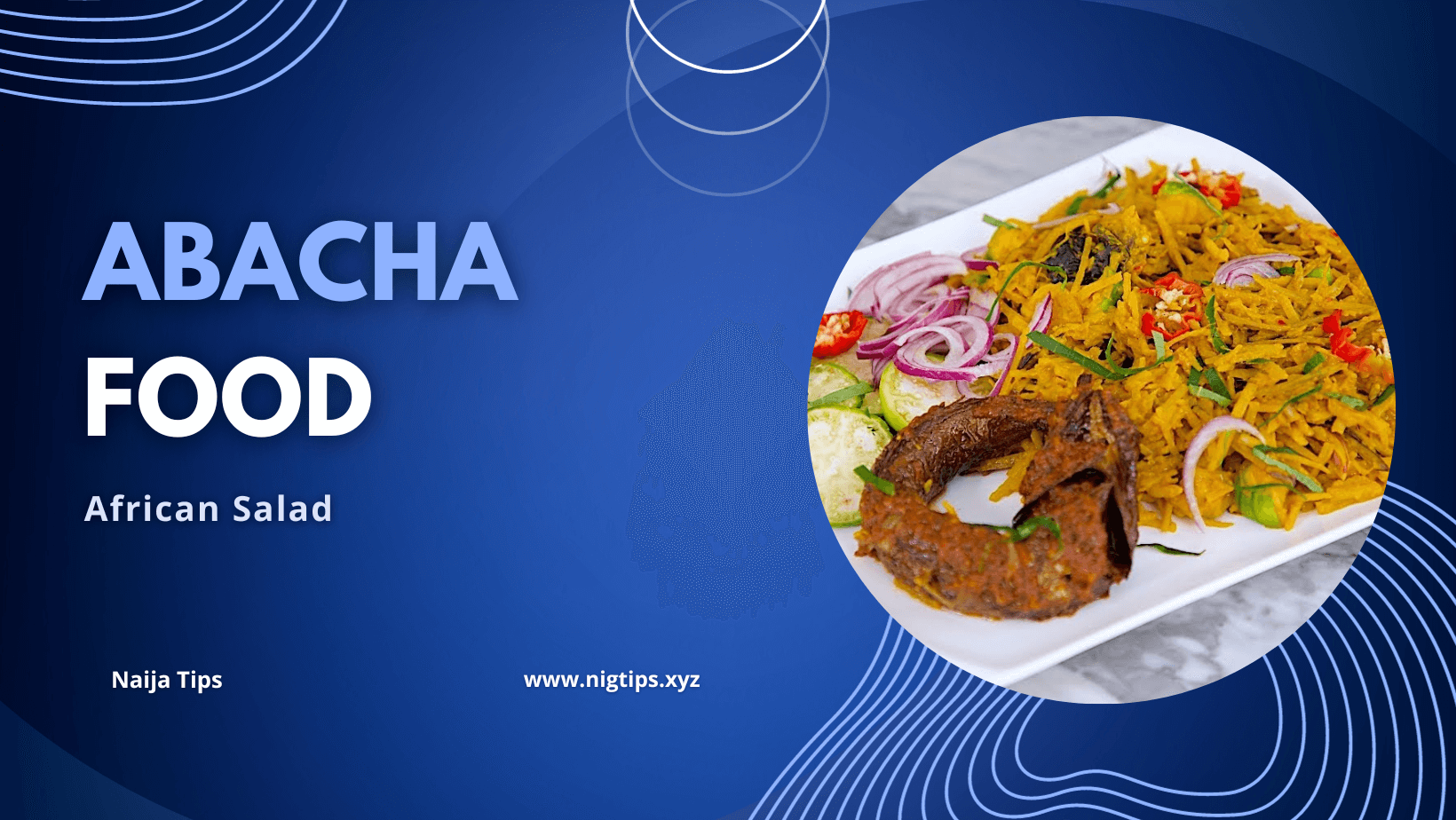Abacha (also referred to as African Salad) is a traditional Nigerian dish prepared from dried and shredded cassava root. Packed full of protein, fibre, essential vitamins and minerals, Abacha makes for an incredibly nutritious food choice that provides important health benefits.
Ingredients of the salad typically include fermented oil bean seed known as Ugba or Ukpaka, fermented smoked fish (like Crayfish or Stock Fish commonly known as Okporoko), onions, vegetables and slices of Utazi leaves sliced thin. It is usually enjoyed alongside refreshing palm wine or your beverage of choice.
Abacha
Cassava is the primary ingredient in Abacha, providing essential carbohydrates, dietary fibre and essential vitamins and minerals such as iron and potassium. Unfortunately it also contains cyanide, which poses serious health risks if not removed appropriately. Grated cassava used in abacha must first be soaked for several hours in cold water to eliminate its cyanide content before being combined with fermented oil bean seed Ugba, onions and pepper as other ingredients to create this delicious dish.
This delicious and nutritious dish can be served either as a snack or full meal, often garnished with vegetables such as tomatoes, cucumbers, and green peppers to add both flavour and nutrition. Additional protein sources like smoked fish or crayfish can further make this meal delicious and filling.
Read: Palm Nut Soup.
Abacha, originally developed by the Igbo people of Eastern Nigeria, is an irresistibly delicious Nigerian dish made of shredded cassava and other ingredients. Enjoyed both locally and globally, it is often featured at weddings or special events as an accompaniment.
Ugba
Ugba is a dish composed of fermented seeds from an African oil bean tree (Pentaclethra macrophylla), commonly eaten in eastern Nigeria as a source of protein, fiber, essential vitamins, and minerals.
Ugba is an excellent source of antioxidants and can be eaten either as a snack or light meal; typically served alongside Nigerian dishes such as jollof rice, white rice or beans; it can even be enjoyed alongside drinks like fresh palm wine or malt for an unforgettable dining experience!
Preparing Ugba can be time consuming and requires much patience, as only clean, hygienic ingredients should be used during its creation to prevent pathogenic and spoilage microorganisms from spoiling it. Furthermore, seeds from African oil bean trees may contain toxic seeds if improperly prepared.
Onions
Abacha is an Afro-Caribbean dish prepared from grated cassava that can be enjoyed as either a main course or snack. Seasoned with salt, pepper and other ingredients to create the ideal balance of flavour, Abacha can also be enhanced by topping it off with veggies such as shredded carrots, green peppers or cabbage to provide crunchiness and freshness to this tasty meal.
One of the key ingredients in Abacha is Ugba, a fermented oil bean seed that is soaked and sieved before adding it to the mixture. Ugba provides both nutrition and flavor; making this ingredient essential to Abacha.
Salt is another essential element in making Abacha, used to bring out the flavors in each ingredient and enhance their overall taste. High quality salt should always be used to obtain optimal results. Lastly, pepper adds an extra spicy kick; its use depends on personal preferences but scotch bonnet pepper is commonly chosen.
Salt
Abacha, a traditional Nigerian dish composed of cassava flour, is an extremely healthy option that can be eaten both at home or restaurants and provides essential vitamins and minerals. Abacha typically comes with various accompaniments including onions, fermented oil bean seed (ugba), palm oil and even fried fish as part of its offerings.
Preparing Abacha is quite simple. To remove any potential health concerns associated with its high cyanide content, grated cassava must first be soaked in cold water to dissolve away its cyanide compounds and ensure optimal digestion of its nutrients.
Once cassava is soaked, it is combined with other ingredients to prepare a dish. Ugba, a fermented oil bean seed that adds both flavor and texture, is the most essential component. Palm oil is another integral element; this vegetable-derived oil comes from oil palm fruit.
Salt and pepper are then used to enhance the dish with their distinctive savory taste, while onions add sweet flavors that help balance all other components.
Pepper
Scotch bonnet peppers, used as the centerpiece of Abacha food, add a sharp, spicy kick that complements its other components perfectly. Pepper is an adaptable spice that can improve any dish while acting as an antimicrobial preservative; its addition is commonly seen in rubs, spice blends and salad dressings alike; it plays a prominent role in Arabic spice mixtures like Zoug and Baharat as well as quatre epices in French cuisine.
To make Abacha, use a large pot and stir regularly - this ensures the ingredients are heated evenly while decreasing the risk of burning at the bottom. Season your Abacha with salt and pepper as desired; but beware when using salt as it contains potassium which may be harmful for pregnant women; for optimal results use baking soda instead as too much potassium can lead to high blood pressure and cardiovascular issues.



Post a Comment
0Comments